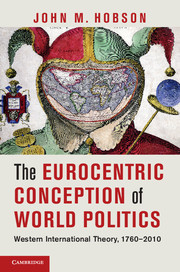Book contents
- Frontmatter
- Contents
- Figures
- Tables
- Acknowledgments
- 1 Introduction
- Part I 1760–1914
- Part II 1914–1945 The high tide of manifest Eurocentrism and the climax of scientific racism
- 6 Anti-imperialism and the myths of 1919
- 7 Racist and Eurocentric imperialism
- Part III 1945–1989 Subliminal Eurocentrism in international theory
- Part IV 1989–2010 Back to the future of manifest ‘Eurocentrism’ in mainstream international theory
- Part V Conclusion Mapping the promiscuous architecture of Eurocentrism in international theory, 1760–2010
- References
- Index
6 - Anti-imperialism and the myths of 1919
Marxist Eurocentrism and racist cultural-realism, 1914–1945
Published online by Cambridge University Press: 05 June 2012
- Frontmatter
- Contents
- Figures
- Tables
- Acknowledgments
- 1 Introduction
- Part I 1760–1914
- Part II 1914–1945 The high tide of manifest Eurocentrism and the climax of scientific racism
- 6 Anti-imperialism and the myths of 1919
- 7 Racist and Eurocentric imperialism
- Part III 1945–1989 Subliminal Eurocentrism in international theory
- Part IV 1989–2010 Back to the future of manifest ‘Eurocentrism’ in mainstream international theory
- Part V Conclusion Mapping the promiscuous architecture of Eurocentrism in international theory, 1760–2010
- References
- Index
Summary
Introduction: critiquing imperialism, defending the West
In certain respects this and the next chapter that cover the 1914–45 era take on a special significance given that this period is conventionally held by IR scholars to be that of the discipline’s ‘infant stage’. For it is a now conventional axiom that the discipline was born in 1919, and that it was furnished with the noble moral purpose of finding ways to solve the universal problem of war for all. Such a purpose derives from the belief that the ‘infant child’ was conceived on the blood-stained battlefields of Europe and whose mother had gone through an extremely traumatic 48-month gestation period. This now conventional view was originally constructed by E. H. Carr in his classic text The Twenty Years’ Crisis (1946/1981), even if it has only been internalized within the historiographical self-imagination of the discipline more recently. In this and the next chapter I want to contribute to the now vibrant revisionist literature, which produces an alternative account and understanding of what might better be called the thirty years’ crisis (i.e., 1914–45). I do so by making five specific revisionist arguments, which hinge on the pivot of my core claim that our conventional image of the birth of IR and of its ‘interwar infancy’ is to an important, though not complete, extent an exercise in myth-making that serves to make IR scholars feel good about themselves and their discipline.
- Type
- Chapter
- Information
- The Eurocentric Conception of World PoliticsWestern International Theory, 1760–2010, pp. 133 - 149Publisher: Cambridge University PressPrint publication year: 2012



